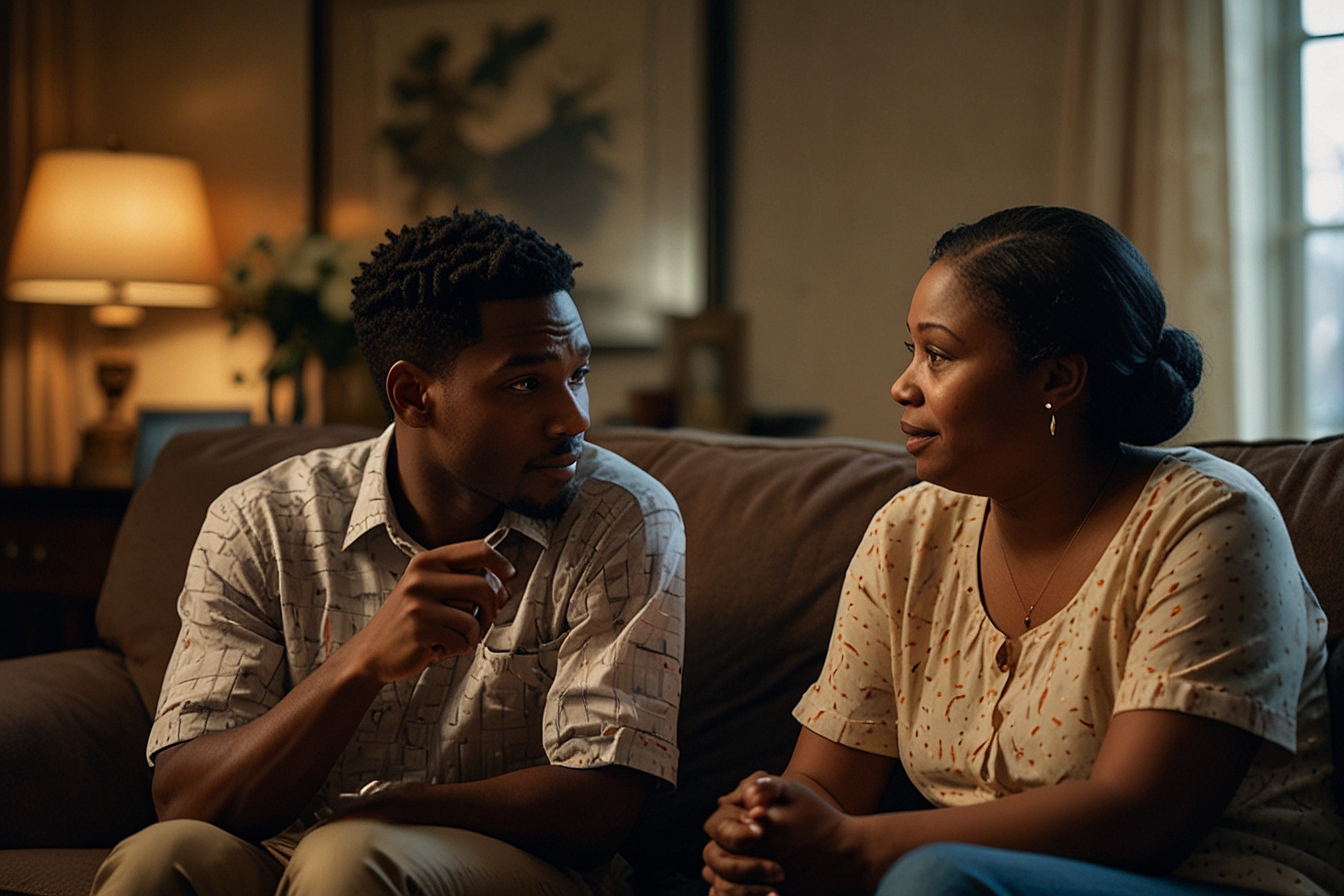Breaking Free: How the Strong Black Woman Adage Silences Our Pain
You might not even realize how the Strong Black Woman adage shapes perceptions of resilience. This stereotype pushes many of us to bury their emotions, fearing that vulnerability shows weakness. It creates an invisible burden that weighs heavily on mental health. As you consider the stories behind this narrative, you may start to see just how deep the impact runs. What if embracing true vulnerability could lead to profound healing?
Key Takeaways
- The "Strong Black Woman" Adage is a Double-Edged Sword
- It fosters resilience but also discourages emotional vulnerability.
- Many Black women feel pressured to suppress pain to meet societal expectations.
- Historical Roots Shape Current Struggles
- Originated during slavery and continued through the Reconstruction Era.
- Society has long perpetuated the image of Black women as unbreakable caretakers.
- Mental Health Implications Are Severe
- Chronic stress, anxiety, and depression result from the expectation to be strong at all times.
- Studies, such as Woods-Giscombé's (2010) research on the "Superwoman Schema," show that many Black women neglect their own well-being to care for others.
- Media Reinforces the Stereotype
- Movies, TV shows, and literature often depict Black women as unwaveringly strong, leaving little room for vulnerability.
- This creates internalized pressure to embody resilience at the expense of emotional well-being.
- Vulnerability is Strength
- Redefining strength means allowing yourself to feel, seek support, and share struggles.
- Recognizing that seeking help is an act of courage, not weakness.
The Origins of the Strong Black Woman Adage
Although the "Strong Black Woman" adage may seem like a modern concept, its roots stretch deep into American history.
You might not realize that this stereotype emerged from the enslavement of Black women who were forced to endure unimaginable hardships. They often had to care for others, including others families, while suppressing their own pain.
The adage evolved during the Reconstruction Era, where society idealized Black women as self-sacrificing matriarchs, perpetuating the belief that they should be unaffected to suffering.
This longstanding portrayal has influenced cultural narratives, shaping how you perceive resilience and strength in Black women today.
How has these historical patterns become embedded in family systems, creating what I call "resilience without relief" – a pattern that looks like strength but actually perpetuates trauma. As Dr. Thema Bryant-Davis notes in her research on cultural trauma, "What begins as survival can transform into a harmful expectation."
The Impact of Stereotyping on Mental Health
The stereotype of the "Strong Black Woman" can significantly affect mental health, often placing unrealistic expectations on Black women to remain resilient and self-sufficient.
This pressure can lead to chronic stress, anxiety, and feelings of isolation. You might find it hard to express your vulnerabilities, fearing judgment or rejection. Instead of seeking help, you may feel compelled to mask your pain, perpetuating a cycle of emotional distress.
The inability to openly acknowledge struggles can create a façade that alienates you from genuine connections. By upholding this stereotype, society diminishes your individuality and humanity, impacting your self-worth.
Recognizing these stereotypes is the first step toward breaking free from their grasp and prioritizing your mental well-being.A study done by Woods-Giscombé's (2010) research on the "Superwoman Schema," which found that many Black women prioritize others' needs at the expense of their own health.
Emotional Vulnerability vs. Cultural Expectations
While facing the pressure of cultural expectations, you might grapple with the need to show emotional vulnerability. Society often expects you to embody strength and resilience, pushing you to suppress your feelings.
You may worry that showing vulnerability will lead others to see you as weak or incapable. This internal conflict can create a heavy burden, preventing you from expressing your true emotions. The fear of judgment might keep you from reaching out for support, leaving you isolated in your pain.
It's crucial to remember that vulnerability doesn't diminish your strength; it's a part of being human. Balancing these expectations while acknowledging your feelings can pave the way for authentic connections and emotional healing.
Embracing vulnerability could lead to a deeper sense of self. Have you ever wondered what freedom might feel like if you didn't have to carry the weight of always appearing strong?
As I explored in my earlier article on GenerationalCurseBreaker.com, https://generationalcursebreaker.com/blogs/blog-article-25211"The Strong Black Woman Myth " vulnerability is actually a form of courage that our ancestors often couldn't safely express.
Stories of Resilience: A Double-Edged Sword
As you hear stories of resilience celebrated within your community, it's easy to feel inspired yet burdened by the weight of expectation. These narratives often uplift, showcasing strength and determination, but they can also create a false ideal that you must always be strong.
This pressure can silence your struggles, making it difficult to express vulnerability. You may feel that sharing your pain contradicts the very resilience that's praised.
As these stories circulate, they shape how you view your own challenges, sometimes leading you to suppress your emotions instead of embracing them.
Recognizing that it's okay to be both resilient and vulnerable is crucial. Understanding this nuanced experience can empower you to acknowledge your pain without losing the essence of your strength.
Beauboeuf-Lafontant (2009) describes this as "the costly performance" of strength – a performance that many Black women maintain at great personal expense. What parts of yourself have you hidden to maintain the appearance of unwavering strength?
The Role of Media in Shaping the Narrative
Media plays a significant role in shaping perceptions of the Strong Black Woman adage, often reinforcing unrealistic ideals.
You see this in countless films, TV shows, and advertisements where Black women are portrayed as unyielding fighters, always resilient despite their struggles. While these narratives celebrate strength, they can silence vulnerability, making it hard for you to express pain or seek help.
By consistently presenting this archetype, the media can neglect the nuanced realities we face. You might feel pressured to embody this strong persona, even when it's far from the truth.
Recognizing these portrayals is crucial. It's important to challenge them and advocate for more genuine representations that embrace both strength and fragility, allowing your experiences to be fully acknowledged.
Yolo Akili Robinson, founder of BEAM (Black Emotional and Mental Health Collective), emphasizes that "media representations often become internalized expectations." How might your relationship with your own emotional needs change if media portrayed Black women seeking support as normal and healthy?
Intersectionality and Diverse Experiences
Understanding intersectionality is essential when discussing the experiences of Black women, especially since these experiences are shaped by overlapping identities like race, class, and gender. Each woman's journey is unique; your struggles may be different than mine based on various economic, political, social factors.
You might think that the portrayal of the strong Black woman applies universally, but it often erases the nuances of individual experiences. The pressures of being seen as resilient can be isolating, leaving many to grapple with their pain alone.
Recognizing this complexity helps you appreciate the diverse voices within the Black community, enabling a more profound understanding of our challenges. Only by acknowledging these intersecting and varied identities can we begin to foster true empathy and connection.
Watson and Hunter's 2015 study on anxiety and depression among African American women found that those who strongly identified with the Strong Black Woman stereotype were less likely to seek psychological help when needed. Does this resonate with your experience or observations?
Challenging the Adages Through Representation
Many representations in film, television, and literature continue to reinforce the strong Black woman adage, often overlooking the complexity of individual identities and experiences.
To challenge this narrative, you can support work that showcases diverse, authentic characters. Seek out stories that reveal vulnerability, joy, and struggle, presenting Black women as multifaceted individuals rather than stereotypes.
Encourage creators to explore personal journeys and embrace narratives that reflect real-life complexities. By amplifying these representations, you can help dismantle the damaging adage and promote understanding.
Pay attention to who's telling the story; diverse voices can enrich mainstream media. Engaging with these nuanced portrayals fosters empathy and creates space for deeper conversations about identity and strength beyond societal expectations. When was the last time you saw a portrayal of a Black woman that felt true to your lived experience?
Creating Spaces for Authentic Expression
How can we create environments that allow for authentic expression among Black women? Start by fostering open dialogues where emotions and vulnerabilities can be shared without judgment.
Encourage spaces where stories are embraced, and diverse experiences are validated. It's crucial to dismantle the notion that strength means silence; instead, redefine strength as the courage to express pain and seek support.
Create groups or workshops where Black women can connect and share their journeys in a safe atmosphere. Utilize art, writing, or other creative outlets as tools for expression, allowing feelings to flow freely.
The Importance of Supportive Communities
Creating authentic spaces for expression naturally leads to the recognition of the importance of supportive communities. These communities provide you with a sense of belonging, allowing you to share your experiences without fear of judgment.
You gain strength from others who understand your struggles, creating a network of empathy and shared resilience. In these spaces, burdens can be lifted, as members validate each other's feelings and experiences.
Supportive communities foster open dialogue, encouraging you to share your pain and triumphs alike. When you engage with those who uplift and empower, you begin to redefine strength, moving away from the silent warrior adage.
Ultimately, these connections nurture healing, helping you reclaim your voice, support your growth, and affirm your identity.
Have you found your community of healing partners? If not, what kind of support would feel most authentic to your journey?
Inspiring Change: Rethinking Strength and Vulnerability
As society evolves, you might find strength in redefining what it means to be resilient. Embracing vulnerability doesn't diminish your strength; instead, it enriches it.
Allowing yourself to feel pain, fear, or uncertainty opens the door to deeper connections and self-awareness. You can inspire change by acknowledging that vulnerability is a form of courage, not weakness.
By sharing your experiences, you help dismantle the myth that the strong Black woman must be invulnerable. Choose to prioritize emotional honesty in your life and encourage others to do the same.
Redefining strength involves recognizing that asking for help and expressing emotions are vital parts of self-care.
Engage with your community to foster an environment where everyone can thrive through shared understanding and support.
For more resources on healing from generational trauma, visit GenerationalCurseBreaker.com, where we offer tools specifically designed for breaking the Strong Black Woman stereotype while honoring our authentic resilience.
Conclusion
To truly break free from the Strong Black Woman adage, we must embrace vulnerability as a strength, not a weakness. You don't have to mask your struggles or carry the weight alone. By fostering supportive communities and challenging harmful stereotypes, you can create a space for authentic expression and healing. Remember, your experience matters, and it's okay to seek help. Redefining what it means to be strong will inspire change and uplift not just you, but others too.
Join our growing community of generational curse breakers at GenerationalCurseBreaker.com, where we're rewriting the narrative together. Remember: acknowledging pain isn't weakness, it's the first step toward true freedom.
What step will you take today toward embracing your full humanity beyond the stereotype?
Lisa R. Gray is a Licensed Professional Counselor (LPC) with 15 years of experience, specializing in trauma, anxiety, and life challenges. As an author and generational healing coach, she is dedicated to breaking generational curses, guiding individuals through inner healing, and supporting trauma recovery.

Breaking Free: The Neuroscience of Healing Generational Trauma

Rewrite Your Family Story: A Compassionate Guide to Generational Healing

Stop Family Pain: 5 Steps to Emotional Freedom